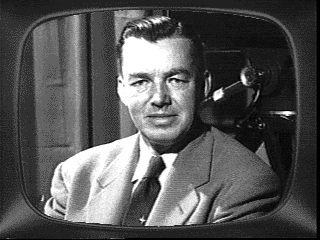
Year Born: 1909Year Died: 1997
Pioneer
Woodill, Wilbur J. “Wilf” (1909-1997)
In 1919, Wilf Woodill built his first crystal set. In 1953, he built Canada’s first privately-owned television station. In between, as an operator, announcer, sportscaster, writer, program director, radio station manager, innovator, he was ever in the forefront of the development of broadcasting in Canada.
Like other starry-eyed broadcasters who followed him, Wilf, at the age of 17, got a start in radio by making himself “useful” to people who had already made the grade. Wilf was a great admirer of hockey broadcaster Foster Hewitt who handled the play-by-play on the Toronto Star station CFCA in the early 20s. He helped carry Foster’s equipment into the old Arena and thus developed a friendship with the dean of sportscasters, and also with other CFCA staffers. Recognizing the teen-ager’s ambition to become a hockey announcer, Foster not only encouraged him, but suggested he adopt the name “Wilf” by which, thereafter, he became known to the trade and the public.
Wilf’s pursuit of a career in broadcasting took him to Regina in 1929 and a job with CHWC, a station founded by Williams Department Store which shared a frequency and time on the air with CKCK, then owned by the Regina Leader (newspaper).
Wilf quickly became the spark-plug in the operation of CHWC, handling the roles of program director, announcer, station manager and hockey broadcaster.
In the 20s and early 30s, live local programs occupied the major part of the schedule. With only one control room and one studio, a converted traveler’s sample room in the Kitchener Hotel to begin with, Wilf arranged for the use of foyers in the Metropolitan and Capitol Theatres, a room in the Champlain (Drake) Hotel, in addition to the ballrooms of the fabulous Trianon and the newly-built Hotel Saskatchewan. At the same time, he fulfilled his ambition to become a second Foster Hewitt by handling the play-by-play of the games at the Regina Stadium.
But at depression-era wages of ten dollars a week, Wilf saw no immediate future in broadcasting and went into business for himself by setting-up a radio repair shop. Coincidentally (and this was before Muzak had come along) Wilf conceived and installed a sound system throughout the Army and Navy Department store which provided background music and shopper information.
However, within a year, he was back in radio – this time at James Richardson’s CJRM (later CKRM) which had set-up studios in Regina. When CJRM’s manager, Vic Neilson, moved to CKSO Sudbury, Wilf joined him and, in 1939, succeeded to the managership.
Wilf’s tenure at CKSO was interrupted in 1944 by service overseas with the U. S. I. S. in London and Paris where he was construction supervisor.
On his return to Sudbury, Canada was less than ten years away from establishing its first TV station. It soon became apparent that the CBC lacked the funds to bring TV to everyone, and so the CBC decided to accept applications for private TV stations which would affiliate with the government network. CKSO was one of the first successful applicants, and Wilf Woodill was determined that it would become the first private Canadian station on the airwaves.With Wilf in the driver’s seat, CKSO-TV was “number one” on October 25, 1953. The station was “in the black” operationally during the first year and has never looked back.
In 1961, having faced and successfully met the challenges in trail-blazing radio and television, Wilf took his leave of Canada and moved to Florida.
Wilf Woodill will be remembered for his many innovative contributions to Canadian broadcasting and for his dedication to the industry.
Wilf Woodill died in Ocala, Florida on September 20, 1997.
Written by J. Lyman Potts – October, 1997
